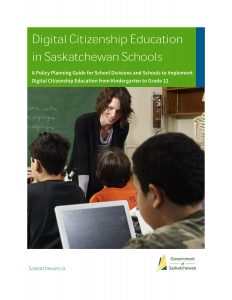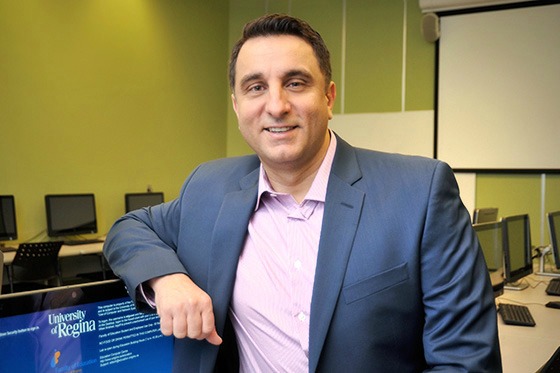University of Regina professor Dr. Alec Couros is about to address an unusually huge class.
More than 8,800 elementary and high school students from across Saskatchewan will connect with Couros on Tuesday, November 17 in a live, interactive broadcast.
The presentation is part of the “2015 Student First Anti-Bullying Forum,” held in conjunction with Bullying Awareness Week in Canada.
Couros is regularly asked to speak to students about these topics, usually in classrooms, school gyms, or auditoriums. The format for this anti-bullying forum offers an opportunity to reach out to far more students at once.
“I’m thrilled to be a part of the forum, and this format provides a unique opportunity for conversation and interaction with students from across the province,” says Couros, who is an Associate Professor of Educational Technology & Media in the Faculty of Education.
“An event of this size and format would certainly be more difficult in a face-to-face context. Digital technologies and access to robust information networks are critical in allowing us to hear from all students, regardless of location.”
Couros will talk to students about both the difficulties and opportunities offered by our increasingly digital world, as well as how young people can develop a positive digital identity and contribute to society in constructive and transformative ways.
“Our students are constantly participating and interacting in online spaces, and this can lead to complexities around issues of digital citizenship and digital identity, including cyberbullying.

“The Internet has become an integral part of our world. Due to the ubiquitous nature of technology in our lives, it is no longer possible to be completely ‘offline.’ Thus, we need to give youth the skills to participate in positive ways and to become upstanders instead of bystanders.”
Couros has built a strong reputation, both in the classroom and on social media. He has more than 95,000 followers on Twitter, and he’s considered one of the pioneers of ‘massive open online courses’ or MOOCS, which can make education more accessible and allow for the global exchange of ideas.“We are no longer learning in isolation. The classroom walls have come down, and we need to give students the tools to take advantage of the incredible opportunities available to them in our connected world,” says Couros, whose presentation at the forum will include plenty of opportunities for students to interact and discuss ways to shape their world.The forum will be moderated by Katia Hildebrandt, a Ph.D. candidate and sessional instructor in the Faculty of Education. She played a vital role in the previous two events, which were held face-to-face.“There was certainly something powerful about bringing students together and giving them the space to connect and collaborate with each other in that setting,” says Hildebrandt, who helped write the teacher facilitation guide for the sessions this week.“But the online format allows for dramatically increased access and provides authentic opportunities for students to engage with these important issues using tools and modalities that are the same or similar to those they already use in their daily lives.”The forum is hosted by the Saskatchewan Ministry of Education in partnership with ‘I am Stronger,’ an initiative from SaskTel to combat bullying in schools.Additional support was provided by the Canadian Red Cross and KidSport.
The Faculty of Education at the University of Regina has a fine reputation for strong undergraduate teacher education programs, graduate programs, and adult education.
 Couros and Hildebrandt recently co-authored the Digital Citizenship Education in Saskatchewan Schools: A Policy Planning Guide for School Divisions and Schools to Implement Digital Citizenship Education From Kindergarten to Grade 12 for the Saskatchewan Ministry of Education. Retrieve from here.
Couros and Hildebrandt recently co-authored the Digital Citizenship Education in Saskatchewan Schools: A Policy Planning Guide for School Divisions and Schools to Implement Digital Citizenship Education From Kindergarten to Grade 12 for the Saskatchewan Ministry of Education. Retrieve from here.
